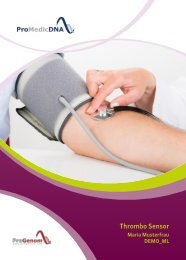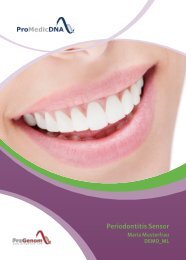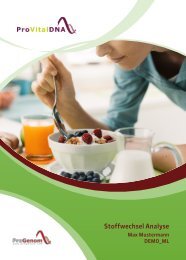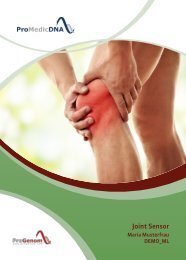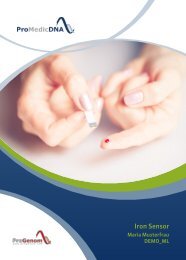ProVitalDNA - Package - DEMO EN
non-medical analysis - ProVitalDNA
non-medical analysis - ProVitalDNA
You also want an ePaper? Increase the reach of your titles
YUMPU automatically turns print PDFs into web optimized ePapers that Google loves.
High GI (glycemic) Index<br />
Food types with a high glycaemic index contain<br />
sugars, that enter the blood stream quickly and<br />
cause a rapid rise of the blood sugar levels. Certain<br />
genes counteract this effect, but some genetic<br />
variants can cause this system to be less effective.<br />
As a consequence, certain genetic types should<br />
avoid food types with a high glycaemic index.<br />
Coffee<br />
Coffee contains a high dose of antioxidants and<br />
hence can be beneficial in the prevention of certain<br />
metabolic problems caused by free radicals. The<br />
caffeine can however have a negative impact on<br />
bone health and should be avoided by certain<br />
genetic types.<br />
Potassium<br />
Potassium is an important nutrient for a variety of<br />
body functions and has a strong impact on blood<br />
pressure and cognitive health. Certain genetic<br />
types benefit from a higher potassium intake.<br />
Calcium<br />
Calcium is an important component of many bodily<br />
functions. Certain genetic types require higher<br />
amounts of calcium for optimal bone health and to<br />
aid in detoxification.<br />
increased.<br />
Methylsulfonylmethan<br />
This organic sulphur compound reduces the<br />
agressivenes of the immune system and can help<br />
protect joints in certain genetic types.<br />
Sodium<br />
Sodium is a component of table salt and can lead to<br />
a rise in blood pressure in certain people.<br />
Oxalic acid, phosphoric acid, phytic acid<br />
These substances are contained within many types<br />
of food and can have a negative impact on bone<br />
health.<br />
Phytosterol<br />
In genetic types, where omega 3 fatty acids have a<br />
negative impact on HDL cholesterol levels,<br />
phytosterols are a good alternative to improve<br />
cholesterol levels.<br />
Purine<br />
Purines can be produced by our bodies, but are also<br />
taken up in high amounts when eating animal<br />
products. Too high amounts of purines can have a<br />
negative impact on joint health in certain genetic<br />
types.<br />
Copper<br />
Copper is an important component of many<br />
enzymes and is therefore an important trace<br />
element for the metabolism. It has also been shown<br />
to reduce the agressiveness of the immune system<br />
and to improve eye health.<br />
Lactose<br />
The milk sugar lactose contains calories and can not<br />
be digested well by some genetic types. Depending<br />
on genetics, certain people react negatively to<br />
lactose and should reduce its consumption.<br />
Lutein and Lycopene<br />
Lutein and lycopene are substances from the group<br />
of carotins and have schown to be beneficial for eye<br />
health. Therefore, an increased intake of these<br />
substances is beneficial for certain genetic types.<br />
Magnesium<br />
Magnesium is an essential component of more than<br />
300 enzymes, and therefore particularly important<br />
for the metabolism, for the functioning of the<br />
muscle cells, as well as for bone health.<br />
Manganese<br />
Manganese is an important component of many<br />
enzymes and has an impact on the protection from<br />
free radicals and of the joints. Certain genetic types<br />
benefit in these areas if manganese intake is<br />
<strong>DEMO</strong>_ML Page 100 of 295







